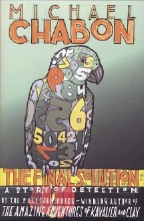The Final Solution
Michael Chabon
Fourth Estate / Harper Collins
US Hardcover First Edition
ISBN 0-060-76571-2
Publication Date: 11-12-2004
131 Pages; $16.95
Date Reviewed: 11-18-04
Reviewed by: Rick Kleffel © 2004

REFERENCES
COLUMNS
|
|
|
The Final SolutionMichael ChabonFourth Estate / Harper CollinsUS Hardcover First EditionISBN 0-060-76571-2Publication Date: 11-12-2004131 Pages; $16.95Date Reviewed: 11-18-04Reviewed by: Rick Kleffel © 2004 |
|
|
REFERENCES |
COLUMNS |
The mental process by which a reader manages to enjoy reading a novel is delicate and difficult to describe. A novel is a balancing act between the prose style and the plot, the characters and the action. In the hands of the most skilled novelists, all of these facets disappear for the reader, who becomes immersed in the experience of reading the work. If the immersion is perfect, the writer can employ the subtlest of suggestions, the slightest of hints with devastating effect.
Michael Chabon is that skilled -- and more so, as he demonstrates in his powerful re-creation of the nineteenth century story of detection titled 'The Final Solution'. Here he presents every pleasure that fiction has to offer. The joys of small-sighted genre fiction, written over a century ago -- clear characters, a clever puzzle, an insightful investigator -- are complemented and enhanced by the precise literary prose that evokes every nuance of people, place and time. This is a novel for all ages in all senses -- not only for young and old, but more importantly for our age, those that preceded it and those we hope will follow.
As much as I enjoyed the fictional experience, the novel for me, at least spoke to the power of filmed adaptations as well. The retired investigator who, in 1944, finds himself keeping bees in the English countryside is Sherlock Holmes in all but name. And I must admit that when the character spoke, I clearly heard the words in the voice of Jeremy Brett, who memorably portrayed Holmes is a series of stellar adaptations broadcast first on PBS. But that's also down to the precise but delicate prose that Chabon uses to weave this tale. The unnamed investigator is now a recluse, who occasionally authors an article on beekeeping but mostly keeps to himself. Until he sees the boy with the bird.
The boy with the bird is Linus Steinmann, a mute Jewish orphan, who with a parrot on his shoulder that recites numbers in German is clearly out of place on the railroad tracks behind the detective's home. He presents a mystery that once again sparks the detective's interest. When a lodger at the house where Linus lives is killed -- and his bird is stolen, he is convinced to take the case.
The pleasures of this short novel -- which, at 131 pages with illustrations, might actually only be a novella -- are so sweet and so strong that the reader is well advised to take their time and savor the work. Chabon's portrayal of the Great Detective is lovingly detailed and poignantly clear. He's not at the top of his game anymore. He's filled with self-doubt and self-criticism. But the puzzle of the boy and the bird awakens something in his mind, and as his investigative and intuitive abilities are engaged, the reader will enjoy every pleasure that fiction may provide. The writing is warm honey on a cool day; the words flow like gentle breeze across a meadow.
The novel is complemented handily by the illustrations of Jay Ryan. From the front cover to the final page, they help create the stately Victorian atmosphere that Chabon achieves with his perfectly mannered prose. But Chabon operates on more than an emotional and intuitive level. He also offers readers the opportunity to experience the very pleasures that the detective himself experiences but at a level the detective is unable to realize. On his way to bring readers to this point of perfection, he manages some breathtaking special prose effects as he moves from one point of view to another.
Given that the novel is set in 1944 and involves a young German Jew, there's an unsettling background to this quite polite tale. But here's where Chabon achieves another first, as he brings forth the enormity of what's happening in the world with the subtlest of suggestions, the gentlest of gestures. Obviously, the title works on a number of levels. But closing the cover, one hopes that it lies in one respect. One fervently hopes that Chabon will take the time to visit his crotchety old detective again, and soon.